A Fight for New Wilderness
Air Date: Week of September 12, 2014
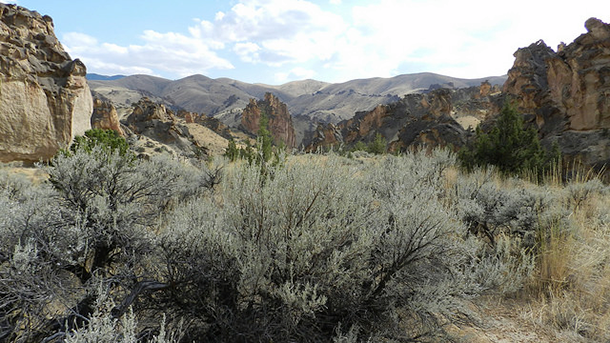
Oregon Natural Desert Association has proposed a 2.1 million acre wilderness area in the Owyhee Canyon lands, but it's a long way from congressional approval. (Photo: Cassandra Profita; EarthFix)
Despite the 1964 Wilderness Act, Congress, local opposition and special interest groups are making it increasingly difficult to protect wild areas from development. Still, as Cassandra Profita from EarthFix reports, individuals continue to fight for wilderness designation.
Transcript
CURWOOD: So as it enters its second half-century, the Wilderness Act has to balance some competing demands. And it's harder to designate wilderness these days than it was back when America was fresh with all the questions about the future of nature raised by publication of Rachel Carson’s bestseller, Silent Spring.
Cassandra Profita from the public media collaboration EarthFix has this story from a proposed wilderness area in the southeast corner of Oregon.
HANSEN: Echo!
PROFITA: Chris Hansen calls out into a desert canyon in Southeast Oregon's Leslie Gulch.
HANSEN: Hello!
PROFITA: Nothing but the faint echo of his own voice calls back. The towering cliff walls surrounding him meet a sprawling expanse of sagebrush above. It's a rich reward for less than a mile of hiking.
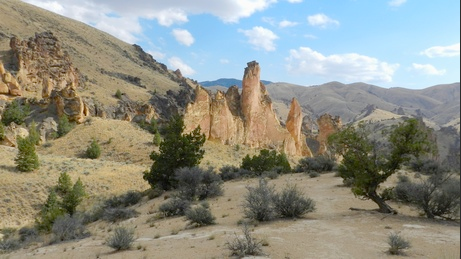
Locals in Oregon's Malheur County worry that a wilderness designation on the Owyhee canyon lands will close roads and restrict access to the land they love to explore. (Photo: Stephen Baboi; EarthFix)
HANSEN: You can see all these colors: Browns and rusts and greens and then mixed with the blue bunch on the hillside. It's just an awesome place to sit and look around and take in.
PROFITA: Hansen works with the environmental group Oregon Natural Desert Association. They put a wilderness designation on this canyon and 2 million acres of the public land surrounding the Owyhee River.
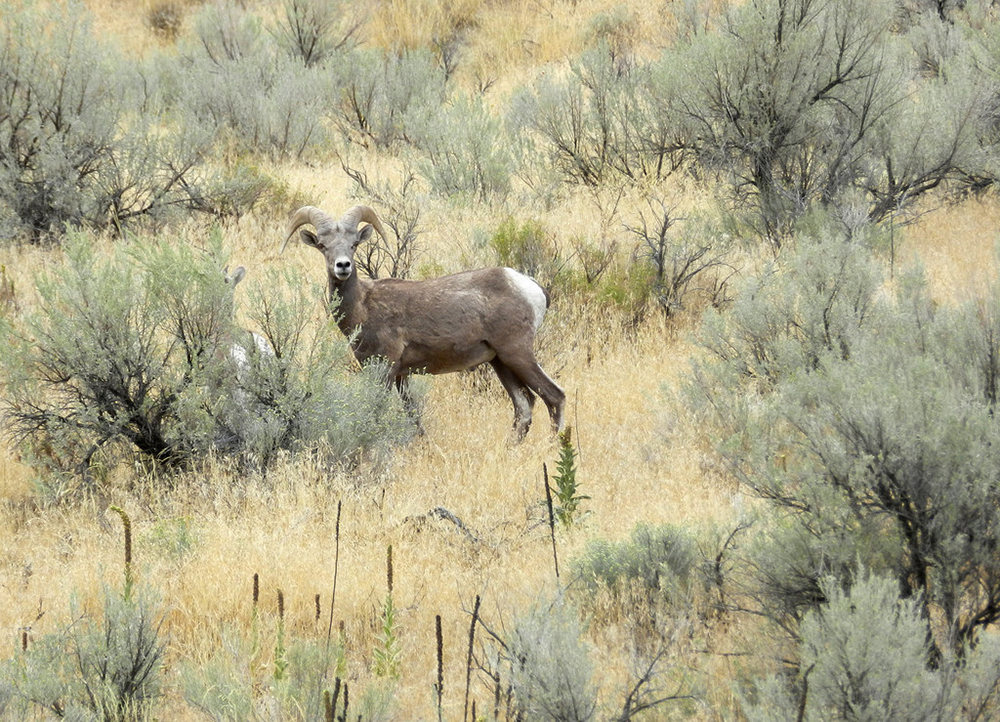
Bighorn Sheep in Owyhee country. (Photo: Cassandra Profita; EarthFix)
HANSEN: How could you not visit this place and say, “How is it not a national park? How is it not a place we haven't protected yet?”
PROFITA: But five years into the effort, a wilderness designation for the Owyhee Canyonlands still seems a long ways off. A committee formed by local leaders voted unanimously against the idea. And no one in Oregon's Congressional delegation has agreed to turn it into a wilderness bill. Congressional approval is required for wilderness designations, and that's hard to come by these days.
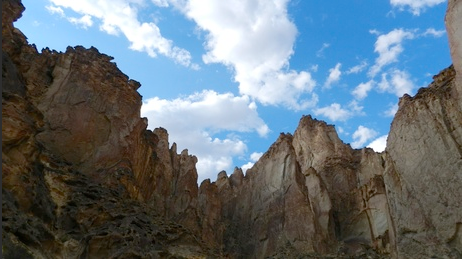
A short hike from a gravel road in southeast Oregon's Leslie Gulch road puts you in a steep-walled red rock amphitheater. It's just a sliver of the proposed 2.1 million-acre Owyhee Canyon lands wilderness. (Photo: Stephen Baboi; EarthFix)
ROWSOME: There are 33 current wilderness bills that are pending in this Congress.
PROFITA: Alan Rowsome is a policy advocate for the Wilderness Society. He says the rate of wilderness designation has dropped off in the last two decades. And now, it's at a near standstill.
ROWSOME: We have passed one wilderness bill through this Congress, but that's the only wilderness bill that has passed in the last five years since 2009.
PROFITA: Rowsome says finding new wilderness opportunities is a challenge as more of the country gets developed. Eighty five percent of the country’s wilderness was created before 1990. For places awaiting designation, getting wilderness bills through Congress is a bigger roadblock than it used to be.
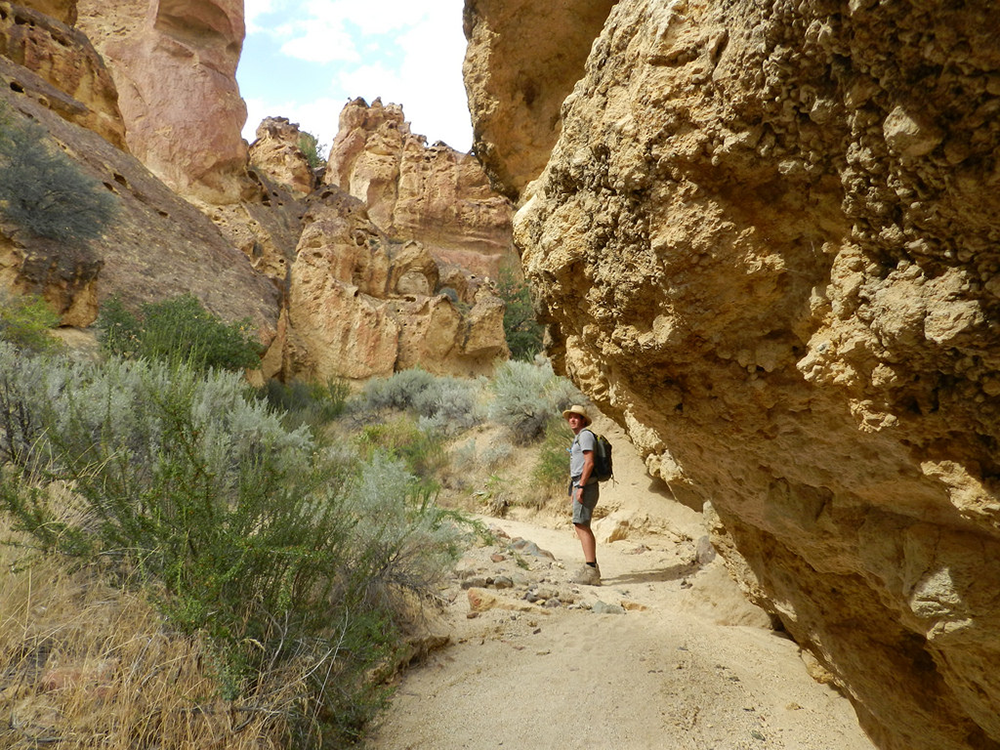
Chris Hansen hikes through a gulch in the Owyhee. (Photo: Cassandra Profita; EarthFix)
WYDEN: It's definitely much, much harder.
PROFITA: Oregon Senator Ron Wyden says passing wilderness bills is harder, for one, because it's so easy for senators to block any bill.
WYDEN: And second, of course, there are powerful special interests, who often are lined up on the other side, and they'll say things like, "Oh, we don't need any more of these kinds of places. Oh, we already have enough of them."
PROFITA: But, he says, in his 30-plus years in Congress, it's never been easy to pass wilderness bills.
WYDEN: I don't know of a single wilderness bill that wasn't a very, very tough, hand-to-hand kind of battle.
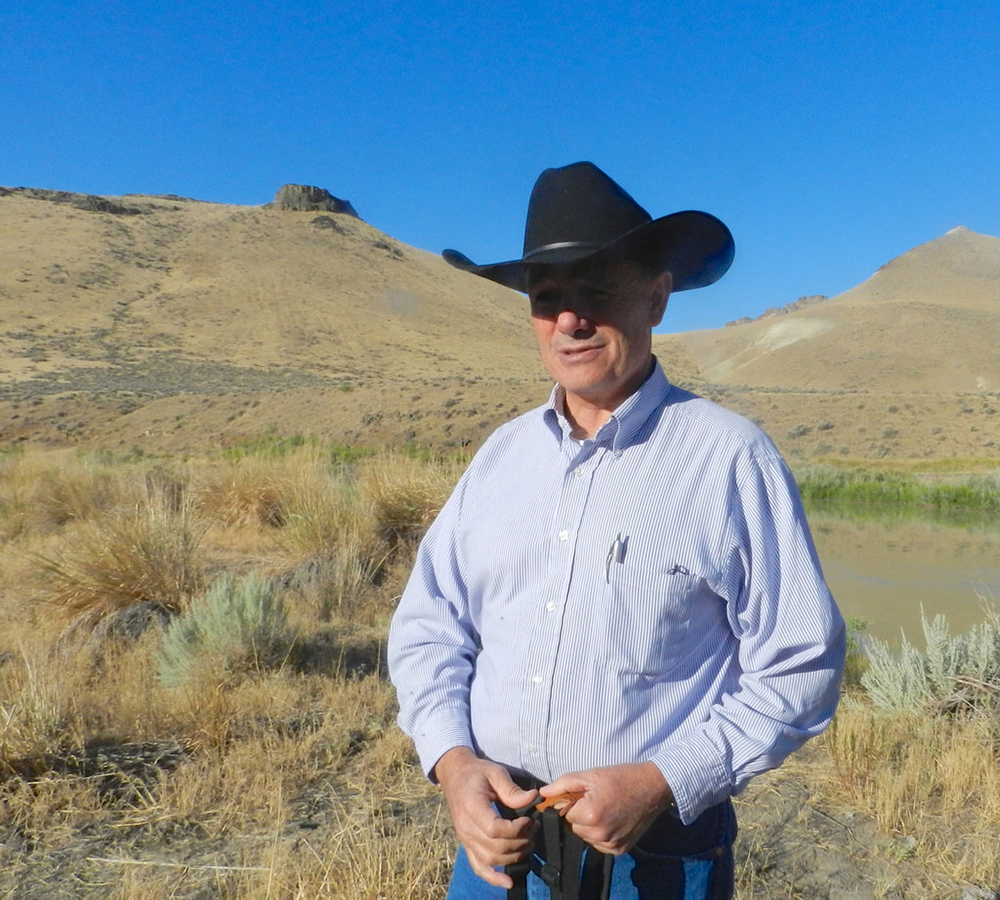
Malheur County Sheriff Brian Wolfe (Photo: Cassandra Profita; EarthFix)
PROFITA: In many places across the Northwest, the battle over wilderness starts long before the bill gets to Congress. With proposals including Washington's Olympic wilderness, Idaho's White Cloud wilderness and Oregon's Owyhee Canyonlands wilderness, the first fight is for local support.
[PLANE ENGINE STARTS]
PROFITA: Malheur County rancher Bob Skinner starts the engine of his airplane. He has more than a thousand cows spread out across his own land and some of the public land within the proposed Owyhee Canyonlands wilderness area. The landscape here is so vast and rugged, he flies a plane to check on the cows grazing on public land where he has a permit known as an allotment.
SKINNER: This is the south side of our allotment.
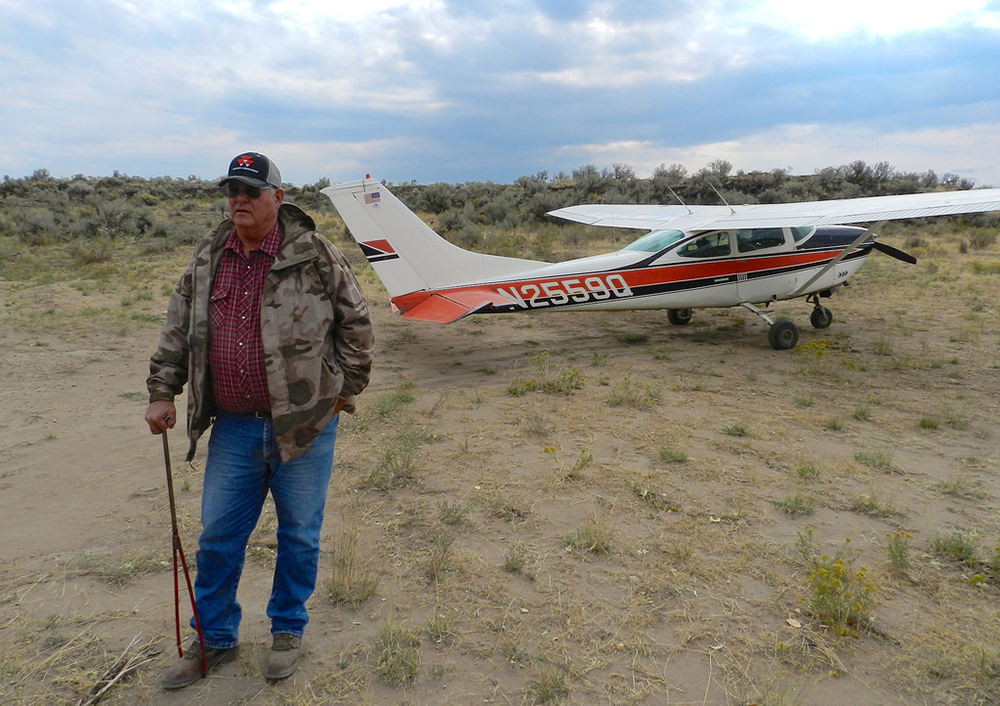
Rancher Bob Skinner (Photo: Stephen Baboi; EarthFix)
PROFITA: The plane offers a bird's eye view of the Owyhee's deep canyons and rolling desert. Skinner says that geography is protective enough. A wilderness designation is not only unnecessary, he says, but it could close roads that people need to fight wildfires and restrict ranchers from grazing.
SKINNER: You see all this? This will all be wilderness, and we're going to fight it for everything we're worth.
PROFITA: Local veterinarian Julie Weikel is on the other side of that fight. She's on the board of the Oregon Natural Desert Association, and she wants a wilderness designation to protect the Owyhee from things like oil and gas development and reckless ATV drivers.
WEIKEL: This is a chunk of country that's not too damaged yet. Because it's desert country, it can easily be harmed.
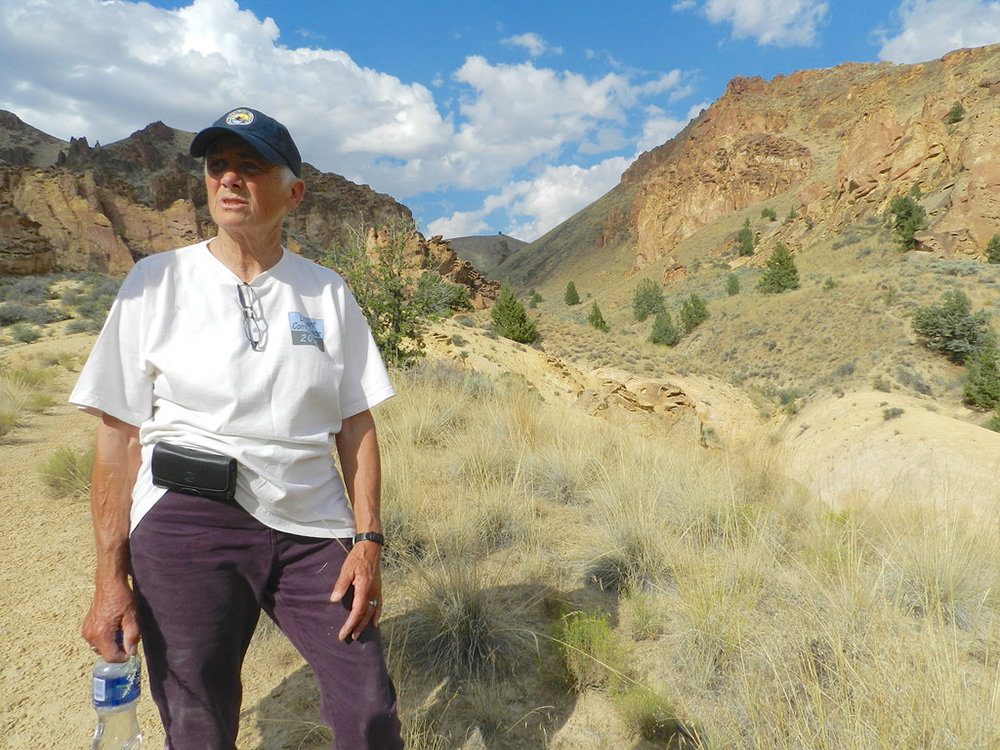
Veterinarian Julie Weikel Supports wilderness on the Owyhee. (Photo: Cassandra Profita; EarthFix)
PROFITA: And at 68, Weikel says, she doesn't want to wait too long to see it protected.
WEIKEL: I'd like to see this in my lifetime, darn it, for sure. I'd like to be able to tell my grandkids, yeah, I tried to help keep this place for you guys. Now take care it, darn it. I hope I get to tell them that.
PROFITA: Weikel says the Wilderness Act has done a good job of protecting special lands. But, she says, if that option takes too long or doesn't get enough local and political support, she'll be looking at other options. I'm Cassandra Profita reporting.
CURWOOD: Cassandra reports for the public media collaborative, Earthfix.
Links
Read about the support for and against Wilderness bills on EarthFix’s website
Living on Earth wants to hear from you!
Living on Earth
62 Calef Highway, Suite 212
Lee, NH 03861
Telephone: 617-287-4121
E-mail: comments@loe.org
Newsletter [Click here]
Donate to Living on Earth!
Living on Earth is an independent media program and relies entirely on contributions from listeners and institutions supporting public service. Please donate now to preserve an independent environmental voice.
NewsletterLiving on Earth offers a weekly delivery of the show's rundown to your mailbox. Sign up for our newsletter today!
 Sailors For The Sea: Be the change you want to sea.
Sailors For The Sea: Be the change you want to sea.
 The Grantham Foundation for the Protection of the Environment: Committed to protecting and improving the health of the global environment.
The Grantham Foundation for the Protection of the Environment: Committed to protecting and improving the health of the global environment.
 Contribute to Living on Earth and receive, as our gift to you, an archival print of one of Mark Seth Lender's extraordinary wildlife photographs. Follow the link to see Mark's current collection of photographs.
Contribute to Living on Earth and receive, as our gift to you, an archival print of one of Mark Seth Lender's extraordinary wildlife photographs. Follow the link to see Mark's current collection of photographs.
 Buy a signed copy of Mark Seth Lender's book Smeagull the Seagull & support Living on Earth
Buy a signed copy of Mark Seth Lender's book Smeagull the Seagull & support Living on Earth

